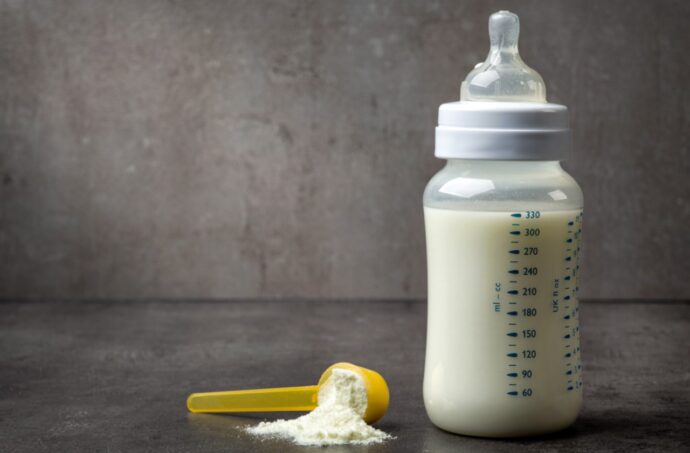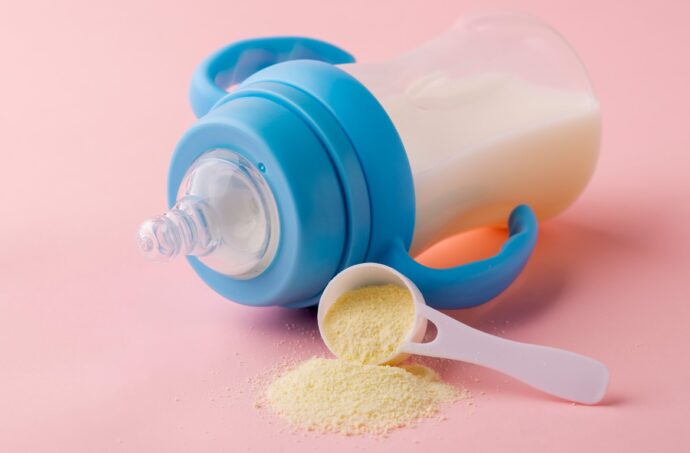Infant formulas are created specifically for babies from birth to 6 months old. Their compositions differ from formulas for toddlers because infants and older babies need a bit different nutrition – infants need time to get used to digesting food, they sleep a lot, and various systems inside their bodies continue to develop.
Toddlers are active and move a lot, they need energy and building materials for their little bodies to grow. To pick the best infant formula for your baby, here are a few expert tips and pieces of advice.
Choose baby formula for the right age
Infant formulas are labeled as PRE or Stage 1 or first milk. They are created for babies from 0 to 6 months old. Infant formulas contain carbohydrates, protein (the whey-to-casein ratio is 60:40, which makes the first milk a very close alternative to breast milk), and a complex of nutrients and useful elements suited for this certain age.
It’s extremely important to feed an infant with PRE or Stage 1 baby formula because its composition is as close to breast milk as possible.
Infant formula should include the following ingredients

Source: thebump.com
These elements are among the most important:
- casein and whey milk proteins – necessary for a baby’s body’s normal development;
- lactose – the main source of sugar in breast milk, so it’s included in the formula as well, controls insulin regulation and development of healthy gut bacteria;
- choline – B family vitamin vital for infant development, plays a role in brain development;
- fatty acids – omega-3 (DHA) and omega-6 (ARA) fatty acids can’t be synthesized by the body and are obtained from food, important for the development of the brain and eyes;
- prebiotics – essential for the forming of healthy gut flora;
- probiotics – live bacteria needed for healthy microflora, help to treat diarrhea and eczema in infants;
- vitamin D3 – important for bone and muscle development and the nervous system development;
- taurine – an amino acid that is significant for an infant’s auditory and visual development.
Avoid these ingredients in baby formula
When you’re choosing infant formula for your little one, avoid the following ingredients:
- palm oil – may cause lower bone density in babies, as the absorption of calcium worsens, and may lead to constipation. Palm oil is allowed to be used in baby formulas but many organic infant food manufacturers avoid using it;
- corn syrup – the source of sugar popular for American baby formulas, but the amount of sugar in it increases the risk of obesity, heart diseases, and type 2 diabetes;
- soy – a rather controversial ingredient. A recent study reported the development of abnormal thyroid function in infants with congenital hypothyroidism who ate soy-based formula. But for babies with animal milk allergies, soy-based formulas might be one of the few possible options;
- carrageenan – a natural thickener made from seaweeds, in some cases, may cause an irritable bowel syndrome;
- synthetic preservatives – may be toxic to a baby’s health, and can lead to food allergies;
- synthetic flavors and colorings – can be bad for an infant’s health, and often cause food allergies and stomach issues.
Technically, it’s fully legal to include all of the mentioned ingredients in baby formulas, but some of them may be bad for your child’s health at once or in the future, so be careful with giving your baby the foods that contain these elements.
Special formulas for any sensitivities

Source: news.delaware.gov
A lot of infants have some stomach issues that make their and the parents’ daily routine not as easy as it could be. Babies with such sensitivities as food allergies, acid reflux, lactose intolerance, sensitive tummy, constipation, colic, and others are often prescribed to be fed with special formulas created specifically for various tummy issues.
However, any special formula should be used only after a consultation with a pediatrician. Only your child’s doctor can determine what kind of a problem your infant suffers and advise the right type of formula.
Such specified baby food products not only are easier to digest but even can in some cases improve your baby’s condition. Infant tummy problems typically are temporary and last only until about 4 months old. After a baby’s digestive system fully develops and becomes stronger, he/she can have either breast milk or baby formula and then solid foods as well, without any problem.
Learn more about infant formula regulations in America and Europe
Infant formula regulations in the US and EU are somewhat different, so when you’re choosing between American and European baby formula brands, you have to consider these differences.
- European regulations of baby food products, in general, are stricter than American.
- In the EU, baby formulas are regulated by the European Commission, while in the US, formulas are regulated by the Food & Drug Administration.
- In Europe, certain probiotics and prebiotics are permitted in infant formulas. In America, probiotics and prebiotics are not FDA-approved for infant formulas.
- In European baby formulas, DHA (omega-3) fatty acids are a required ingredient, while for American manufacturers, it’s optional.
- American PRE and Stage 1 infant formulas contain higher levels of iron than European baby foods.
- In the EU, it’s required that a minimum of 30% of carbohydrates must be lactose. In the US, carbohydrates in baby formula composition aren’t regulated at all. However, the FDA regulates 30+ nutrients that should be included in American infant formulas.
In short, European infant formulas are regulated more strictly and thoroughly. For example, to label a baby formula organic, manufacturers in the EU must use at least 95% of organic ingredients. To be certain of the quality of baby foods you pick for your precious baby, buy european baby formula at organicsbestshop.com.
Conclusion

Source: today.com
To choose the best and most useful infant formula for your baby, you need to consider a lot of different things – from the infant’s age to the composition of the formula to any existing health issues, etc.
If you have hesitations or your baby has stomach issues, it’s safer to consult a pediatrician as to which infant formula to choose. But in any case, always pay close attention to your child’s reactions to new baby food – tummy problems, rash, non-stop crying, refusing to eat, and similar things.
This might mean that a particular baby formula doesn’t agree with your little one and you need to switch to another option. Luckily, there are dozens of different American and European formula brands in the market, so you always have plenty of options.




